R.J. Stowell's Blog: rjsomeone, page 67
June 25, 2018
Close the Window. It's Too Beautiful
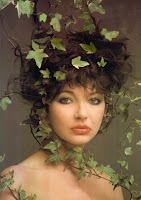 There may be nothing on record like The Ninth Wave (side two of Hounds of Love). Conceptually as adept as Days of Future Past, few artists swim this deep. According to Kate, The Ninth Wave is about "this person being in the water. How they've got there, we don't know, but the idea is that they've been on a ship and they've been washed over the side so they're alone, in this water. Now I find that horrific imagery, the thought of being completely alone in all this water. And they've got a life jacket on with a little light so that if anyone should be traveling at night, they'll see the light and know they're there. And they're absolutely terrified. And they're completely alone at the mercy of their imagination. Which again, I personally find such a terrifying thing, the power of one's own imagination being let loose on something like that. And the idea that they've got it in their head that they mustn't fall asleep. Because if you fall asleep when you're in the water, I've heard that you roll over and so you drown so they're trying to keep themselves awake."
There may be nothing on record like The Ninth Wave (side two of Hounds of Love). Conceptually as adept as Days of Future Past, few artists swim this deep. According to Kate, The Ninth Wave is about "this person being in the water. How they've got there, we don't know, but the idea is that they've been on a ship and they've been washed over the side so they're alone, in this water. Now I find that horrific imagery, the thought of being completely alone in all this water. And they've got a life jacket on with a little light so that if anyone should be traveling at night, they'll see the light and know they're there. And they're absolutely terrified. And they're completely alone at the mercy of their imagination. Which again, I personally find such a terrifying thing, the power of one's own imagination being let loose on something like that. And the idea that they've got it in their head that they mustn't fall asleep. Because if you fall asleep when you're in the water, I've heard that you roll over and so you drown so they're trying to keep themselves awake."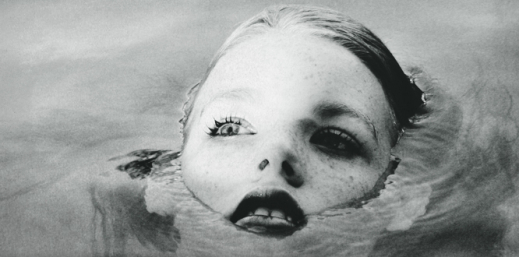
"Wave after wave, each mightier than the last,/ Till last, a ninth one, gathering half the deep/ And full of voices, slowly rose and plunged/ Roaring, and all the wave was in a flame:…" Yeah, when a song suite includes liner notes from Tennyson - to quote Kate, "Wow." In mariner folklore, waves come in threes in a set of three*. The last wave, the ninth, is the largest and most debilitating. And so our story begins. "Really for me, from the beginning, The Ninth Wave was a film. That's how I thought of it." The suite begins with "And Dream of Sleep," our narrator at sea, in the water, bobbing like a buoy: "Little light shining,/ Little light will guide them to me./ My face is all lit up,/ My face is all lit up. If they find me racing white horses, [white caps] / They'll not take me for a buoy./ Let me be weak,/ Let me sleep/ And dream of sheep." A voice is heard providing information to all the ships at sea, and then Kate's mother, closer, yet spiritual and aloof: "Come here with me now." Kate, we can only assume struggles to stay awake, but a contradiction is clear, she's cold, the struggle is increasingly difficult: "Let me be weak,/ Let me sleep/ And dream of sheep."
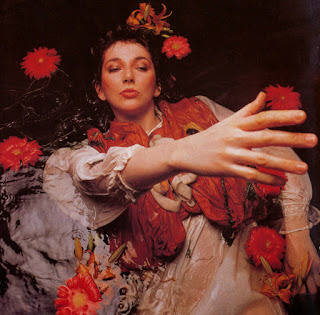 "Ooh, their breath is warm
"Ooh, their breath is warmAnd they smell like sleep,
And they say they take me home.
Like poppies heavy with seed
They take me deeper and deeper."
"When I was little, and I'd had a bad dream, I'd go into my parents' bedroom round to my mother's side of the bed. She'd be asleep, and I wouldn't want to wake her, so I'd stand there and wait for her to sense my presence and wake up. She always did, within minutes; and sometimes I'd frighten her—standing there still, in the darkness in my nightdress. I'd say, 'I've had a bad dream,' and she'd lift the bedclothes and say something like 'Come here with me now.' It's my mother saying this line in the track, and I briefed her on the ideas behind it before she said it."
Flaubert’s dying words were, "Close the window. It's too beautiful." It's how I feel as the suite begins: Press pause, it's too beautiful." Like opium, she is lulled into a hallucinatory state, and now, so cold, she dreams of skating away on ice ("Under Ice"). Listen for the voice at 00:47. Is it someone calling out to her? Worried? There is thunder in the distance, then louder; still she is skating away. Softly, but still obvious, we hear the distinctive blip of sonar. As Kate yells, if halfheartedly, "It's me," the track transitions into piano and silence, the coming out of a dream. A voice: "You must wake up," and a laundry list of those who have awakened her in the past:
"A good morning, ma'am. Your early morning call."/ "You must wake up!"/ "Wake up!"/ "Wake up, man!"/ "Wake up, child! Pay attention!"/ "Come on, wake up!"/ "Wake up, love!"/ "We should make the night, but see your little light's alive!"/ "Stop that lyin' and a-sleepin' in bed--get up!"/"Ma needs a shower. Get out of bed!"/ ["Little light..."]/ "Can you not see that little light up there?"/ "Where?"/ "There!"/ "Where?"/ "Over here!"/ "You still in bed?"/ "Wake up, sleepy-head!"/ "We are of the going water and the gone. We are of water in the holy land of water"/ "Don't you know you've kept him waiting?"
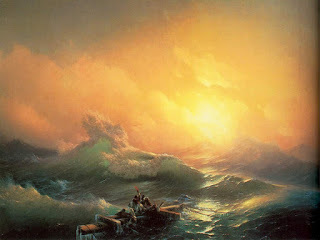 Ivan Konstantinovich Aivazovsky - The Ninth WaveAnd finally, a squeaky voice, "Look who's here to see you." Amidst the wakeners is the phrase "Little light…" The light of her life jacket? The little light of her soul?
Ivan Konstantinovich Aivazovsky - The Ninth WaveAnd finally, a squeaky voice, "Look who's here to see you." Amidst the wakeners is the phrase "Little light…" The light of her life jacket? The little light of her soul?Here Kate has created one of those tracks that may seem merely to propel the theme forward, something like the ticking of the clocks from Pink Floyd's "Time," which could initially be dismissed as transitional fluff; indeed Alan Parsons had been fooling around with new equipment in a clock shop. The band, according to Gilmour, heard it and said, "Great! Stick it on." That's the kind of mistake you want, one that takes on life, one that becomes meaningful of its own accord. But that is not the case with the ridiculously thoughtful opening to "Waking the Witch." This is calculated, strategic and T.S. Eliot over the top.
I have to stop here and go to bed. Press pause. It's too beautiful.
*In Irish mythology, the Ninth Wave is the barrier that separates the Earthly world from the Hy Breasil, or "Otherworld." The legends told of a mystical place that lay beyond the West Coast of Ireland, far out across the sea. This island was invisible to the naked human eye and only accessible if you managed to survive the mighty onslaught of the ninth wave. The wave would have had deadly consequences for a flimsy fishing vessel; hence the fear that such a wave could carry its victim off of the mortal plane. (The bodies of those lost at sea were very rarely recovered, so it’s possible that the idea that they had been swept away to some mysterious island would have provided comfort for families left behind.) Tennyson uses it here to strengthen the notion that King Arthur was more than just a mortal, having been borne not from a woman but from the wave that separates us from the "Otherworld." It may also be worth noting that the legend of a magic land found across the West Sea, where the spirits of the dead dwell, is a theme on which Tolkien drew for the Lord Of The Rings trilogy; Frodo and the Elves travel to the West as they come to the end of their mortal lifetimes.
Published on June 25, 2018 04:12
The Ninth Wave - I Put This Moment Here
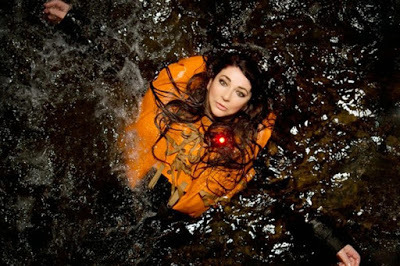 For "Watching You Without Me," our narrator is seemingly having an out of body experience. "You watch the clock/ Move the slow hand./ I should have been home/ Hours ago,/ But I'm not here./ But I'm not here." Backmasked, indecipherable vocals express a drenched ghost in her own home, dripping water onto the rug, as her loved one stands watching the ticking hands of the clock, The heart-wrenching tune is that of regret, sorrow: "You can't hear me./ You can't hear what I'm saying to you."
For "Watching You Without Me," our narrator is seemingly having an out of body experience. "You watch the clock/ Move the slow hand./ I should have been home/ Hours ago,/ But I'm not here./ But I'm not here." Backmasked, indecipherable vocals express a drenched ghost in her own home, dripping water onto the rug, as her loved one stands watching the ticking hands of the clock, The heart-wrenching tune is that of regret, sorrow: "You can't hear me./ You can't hear what I'm saying to you."The frenetic "Jig of Life" pushes its way into the picture; our narrator face to face with her future self-urging: hang on, don’t let go. (Peter Gabriel’s "Don’t Give Up," of course, comes to mind.) And then, amidst this Red Shoes hysteria: "Columbia now nine times the speed of sound." "Roger that, Dan, I've got a solid TACAN locked on, uh, TACAN twenty-three." Communications between NASA and astronaut Dan Brandenstein on the space shuttle Columbia put us in orbit. "This is the point where she's so weak that she relives the experience of the storm that took her in the water, almost from a view looking down on the earth up in the heavens, watching the storm start to form - the storm that eventually took her and that has put her in this situation." "Hello, Earth" is inexplicable sublimity: "Hello, Earth./ (Hello, Earth)/ With just one hand held up high/ I can blot you out, out of sight./ Peek-a-boo, Peek-a-boo, little Earth."
And then, all that built up, now pent-up emotion is released in what, at least to this writer, is among the most beautiful musical endeavors ever created - Barber’s "Adagio" beautiful! "All you sailors,/ ('Get out of the waves! Get out of the water!')/ All life-savers,/ ('Get out of the waves! Get out of the water!')/ All you cruisers,/ ('Get out of the waves! Get out of the water!')/ All you fishermen,/ Head for home./ Go to sleep, little Earth.” For me, a spiritually selective soul, "All you fishermen" conjures up my faith from deep within, an epiphany.
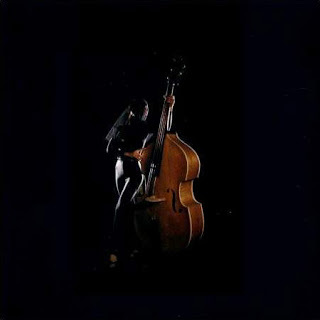 Kate Bush in 1992 on the BBC's Radio 1: "Hello Earth" was a very difficult track to write, as well, because it was... in some ways it was too big for me. [Laughs] And I ended up with this song that had two huge great holes in the choruses, where the drums stopped, and everything stopped, and people would say to me, "What's going to happen in these choruses," and I hadn't got a clue. [The song is played.]
Kate Bush in 1992 on the BBC's Radio 1: "Hello Earth" was a very difficult track to write, as well, because it was... in some ways it was too big for me. [Laughs] And I ended up with this song that had two huge great holes in the choruses, where the drums stopped, and everything stopped, and people would say to me, "What's going to happen in these choruses," and I hadn't got a clue. [The song is played.]"We had the whole song, it was all there, but these huge, great holes in the choruses. And I knew I wanted to put something in there, and I'd had this idea to put a vocal piece in there, that was like this traditional tune I'd heard used in the film Nosferatu. And really everything I came up with, it with was rubbish really compared to what this piece was saying. So we did some research to find out if it was possible to use it. And it was, so that's what we did, we re-recorded the piece and I kind of made up words that sounded like what I could hear was happening on the original. And suddenly there were these beautiful voices in this chorus that had just been like two black holes. [The song is continued]
"In some ways I thought of it as a lullaby for the Earth. And it was the idea of turning the whole thing upside down and looking at it from completely above. You know, that image of if you were lying in water at night and you were looking up at the sky all the time, I wonder if you wouldn't get the sense of as the stars were reflected in the water, you know, a sense of like, you could be looking up at water that's reflecting the stars from the sky that you're in. And the idea of them looking down at the earth and seeing these storms forming over America and moving around the globe, and they have this like huge fantastically overseeing view of everything, everything is in total perspective. And way, way down there somewhere there's this little dot in the ocean that is them.
And indeed, somewhere in the dark, there is a light. Our narrator has spent the night in open waters, battling for life, and nearly losing. But at first light, she is rescued. Perhaps someone saw, in the blue haze of early dawn, her "little light." With "The Morning Fog," Kate's heroine is rescued. I'm so tired and sad and happy and life is grand and fragile and "D'you know what? I love you more now."
KB: "Well, ['The Morning Fog' was] really meant to be the rescue of the whole situation, where now suddenly out of all this darkness and weight comes light. You know, the weightiness is gone and here's the morning, and it's meant to feel very positive and bright and uplifting from the rest of dense, darkness of the previous track. And although it doesn't say so, in my mind this was the song where they were rescued, where they get pulled out of the water. And it's very much a song of seeing perspective, of really, you know, of being so grateful for everything that you have, that you're never grateful of in ordinary life because you just abuse it totally. And it was also meant to be one of those kind of "thank you and goodnight" songs. You know, the little finale where everyone does a little dance and then the bow and then they leave the stage.
Published on June 25, 2018 04:12
June 24, 2018
The Hounds of Love
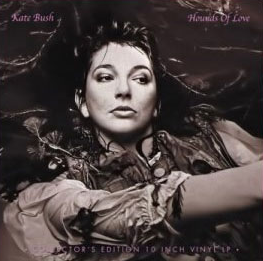 1985 was a coming of age musically for the 80s. From Meat is Murder to Tom Waits’ phenomenal Raindogs to The Waterboys and Prefab Sprout, 1985 outshines any other year in the decade thus far.
1985 was a coming of age musically for the 80s. From Meat is Murder to Tom Waits’ phenomenal Raindogs to The Waterboys and Prefab Sprout, 1985 outshines any other year in the decade thus far. Comparisons to Peter Gabriel's third eponymous LP were inevitable. Kate Bush, like friend and sometime collaborator Gabriel, seemed intent on stretching the song form to its limit, cramming full the aural spectrum with shading and drama, while replacing "moon-June-spoon" lyrics with intricately structured, beautifully calibrated narratives. Yet Kate displayed a far more feminine sensibility (duh), and thus her compositions were warmer, fuller, more deeply personal. Hounds of Lovewas her masterpiece, coming on the heels of the wildly adventurous The Dreaming, and years before the more "sexual" – and less interesting – Sensual World (despite that incredible take on Molly Bloom’s orgasm in Ulysses). The first half of the album is astonishing to this day, revealing Bush's mastery of both her songcraft and of the cutting-edge electronics at her disposal in 1984. Capable of conveying complex sentiment in an intricately structured framework, Kate posited herself as the natural successor to Joni (Hejiradays) and Rickie Lee Jones, albeit with a decidedly British bent.
The album's B side, "The Ninth Wave" is a staggering contemplation of the afterlife, incorporating such divergent elements as Celtic bagpipes, ambient sound effects, multi-tracked voice-overs, witchesand Tibetan chanting to form a cohesive, compelling whole. Richly symbolic and utterly convincing, this section is indeed art rock in the best sense of the term: experimental, audacious, and grippingly original. From the opening segments of "And Dream of Sheep" to the emotionally crushing "Hello Earth," if you are not in tears upon listening, your heart has been ripped away. With the line, "All you fisherman," the rest of us are emotionally drained. Flaubert's dying words were, "Close the window, it's too beautiful." That somehow fits here.
 “It’s in the trees! It’s coming!”
“It’s in the trees! It’s coming!”Made entirely at her own 48-track home studio and delivered whole to EMI as a finished work, Hounds of Love's most striking element is vividly apparent: that spirit of experimentation at every turn. The 80s were far from the artless decade that critics imply – Peter Seville, The Cure, David Salle, New Order, Gilbert and George, and this; enough to carry us through that snoozefest called the 90s. A career rife with superb albums, Kate has never before or after matched Hounds of Love for sheer mastery of form or sense of purpose.
Published on June 24, 2018 05:27
June 23, 2018
The Red Shoes - But...
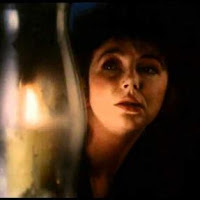 There was an implication in the last post that I wasn't a fan of The Red Shoes; some of it, I'm not. I can do without "Eat the Music" and "Rubberband Girl," and there is an obvious disappointment after a feat like The Ninth Wave. The rest of the LP, though, is phenomenal, if reluctant maturity. In particular, there are several tracks that cannot be overlooked as among the best of Kate's canon. "Top of the City" is one. Inspiring and bittersweet, the song is an extended metaphor, the personification of a city. There's a strange feeling here as she watches over him and the city from above it all, like an out of body experience; like an angel talking about loneliness and love. In my most imaginative, she is a ghost who watches over the lover she left behind.
There was an implication in the last post that I wasn't a fan of The Red Shoes; some of it, I'm not. I can do without "Eat the Music" and "Rubberband Girl," and there is an obvious disappointment after a feat like The Ninth Wave. The rest of the LP, though, is phenomenal, if reluctant maturity. In particular, there are several tracks that cannot be overlooked as among the best of Kate's canon. "Top of the City" is one. Inspiring and bittersweet, the song is an extended metaphor, the personification of a city. There's a strange feeling here as she watches over him and the city from above it all, like an out of body experience; like an angel talking about loneliness and love. In my most imaginative, she is a ghost who watches over the lover she left behind.And I don't mind if it's dangerousI don't mind if it's rainingTake me up to the top of the cityAnd put me up on the angel's shouldersTake me to the top of the cityOne more step to the top of the cityAnd put me up on the angel's shoulders
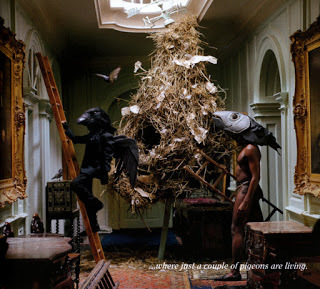 And then there's "Moments of Pleasure." So beautiful and melancholy. So personal and standoffish, and yet somehow, we all relate to the emotion. Perhaps Kate's most iconic piano ballad, "Moments of Pleasure" was released as the second single from The Red Shoes. It conveys Kate's remembrance of those who have impacted her life and have since passed on. The most notable of these is her mother, Hannah Bush, who was sick at the time of recording.
And then there's "Moments of Pleasure." So beautiful and melancholy. So personal and standoffish, and yet somehow, we all relate to the emotion. Perhaps Kate's most iconic piano ballad, "Moments of Pleasure" was released as the second single from The Red Shoes. It conveys Kate's remembrance of those who have impacted her life and have since passed on. The most notable of these is her mother, Hannah Bush, who was sick at the time of recording.Her mother said, "Every old sock needs an old shoe." It's an old Gaelic or English saying. So warm, yet with her mother there and suffering, she sings "Just being alive; it can really hurt."
And, of course, there are few songwriters who can pull off the line, "Don't want your bullshit. Just want your sexuality." The Red Shoes is far from the AM10 of Hounds of Love but what it offers well is songwriting at it most gut-wrenching.

Published on June 23, 2018 05:54
The Red Shoes - Kate Bush
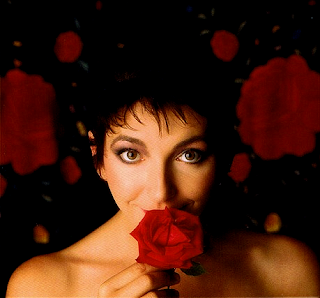 I wrote this article for the Rutgers College newspaper (The Targum), nearly 100 years ago (several years after the release of The Red Shoes); a little childish, it seems to appreciate The Red Shoes more than I remember. What I do recall is dismissing the LP for quite some time, finding it disappointing, even subpar. It has only been in recent years that the album and I have reconciled, particularly incredibly textured songs like "Moments of Pleasure":
I wrote this article for the Rutgers College newspaper (The Targum), nearly 100 years ago (several years after the release of The Red Shoes); a little childish, it seems to appreciate The Red Shoes more than I remember. What I do recall is dismissing the LP for quite some time, finding it disappointing, even subpar. It has only been in recent years that the album and I have reconciled, particularly incredibly textured songs like "Moments of Pleasure": There are two types in this world - those who get KB, and those who don't. Bjork produces similar polarity, and if Ms Gottmasdottir doesn't have the complete KB in her collection, I'll eat my own head. People who don't get Kate should, of course, be rounded up and sent to Camp CT-Scan, just to see if something is there (never mind, we don't want you anyway). NOT getting Kate is like saying, "I don't like The Beatles". Whenever I hear someone say those 5 words, a red mist descends and I want to pull out hair (not mine, theirs) or say what I really think: You are a stupid asshole. Those who say, "Oh, isn't she all witchy-woo and weird?" as if that's cause enough not to listen, are bobbing up and down with their car radios blasting [replace 90's equivalent with Taylor Swift]. Kind of like saying that Kraft American Singles are your favorite cheese. Kate is not witchy-woo (I don't even know what that means), she's an innovator, a true soul singer (in that what she does touches a part of you that very few others reach) and the Greatest Living Englishwoman. Sorry, carried away [Today she may tie J.K. Rowling].
 Anyway, The Red Shoes. Kate (may I call you Kate? Please say yes, I'm not a stalker or anything, though I have collected hair from your drain cover, but only for personal use) has this habit of entering a studio, making endless cups of tea, twiddling about with her piano for, say, 8 years, and then eventually releasing an album. Time between LP's has become greater and greater and now we're still waiting for a follow up to this, her last. At Kate's current rate, we can expect something by the time monkeys rule the earth and Charlton Heston's throws a hissy fit at the Statue of Liberty. Kate, I love you, but with all due respect, get your finger out. We're desperate out here. In an age when Madonna is considered the great creative female force in music, you are sorely missed, you selfish thing. What do you want? A life? Sorry, love, you've made your bed and now you've got to get out there and show everyone else what they should be doing. And if you don't, by thunder, I'll put on a brunette wig and do it myself (oh, if only I had talent, I'd show the bitches). Oh, The Red Shoes: The Red Shoes is a concept album, or if not, then it's a....keep with me, I'm thinking...a "themed album based around the feelings of loss, pleasure and ecstasy." It's an extremely accessible collection of songs, more so than any other album in her canon (more so than even Hounds Of Love, I'd say, but then, I do have a chronic personality disorder).
Anyway, The Red Shoes. Kate (may I call you Kate? Please say yes, I'm not a stalker or anything, though I have collected hair from your drain cover, but only for personal use) has this habit of entering a studio, making endless cups of tea, twiddling about with her piano for, say, 8 years, and then eventually releasing an album. Time between LP's has become greater and greater and now we're still waiting for a follow up to this, her last. At Kate's current rate, we can expect something by the time monkeys rule the earth and Charlton Heston's throws a hissy fit at the Statue of Liberty. Kate, I love you, but with all due respect, get your finger out. We're desperate out here. In an age when Madonna is considered the great creative female force in music, you are sorely missed, you selfish thing. What do you want? A life? Sorry, love, you've made your bed and now you've got to get out there and show everyone else what they should be doing. And if you don't, by thunder, I'll put on a brunette wig and do it myself (oh, if only I had talent, I'd show the bitches). Oh, The Red Shoes: The Red Shoes is a concept album, or if not, then it's a....keep with me, I'm thinking...a "themed album based around the feelings of loss, pleasure and ecstasy." It's an extremely accessible collection of songs, more so than any other album in her canon (more so than even Hounds Of Love, I'd say, but then, I do have a chronic personality disorder). Once again, an array of sonic armory (I nicked that phrase off Lester Bangs) is at hand to highlight Kate's already Technicolor palette. Ethnic instrumentation, vocal ticks, strings, Prince, you name it, it's probably there somewhere. So we go from the title track, a Celtic-Middle Eastern bonkers-athon that's as catchy as anything Miss B's ever made, to the high point of the album, and certainly one of Kate's highlights full stop, "Moments Of Pleasure." Here's Kate singing about purely personal, well, moments of pleasure, from her life, but somehow making them part of your life by the time the song is over, and you don't even know Smurf. (I do hope it's a real Smurf; it would be truly avant-garde if Kate were recording with tiny blue Scandinavian gnomes. Sweeping, private, accessible,intimate, commercial, arty, worldly, English. Everything that Kate Bush is, of course.
Published on June 23, 2018 04:27
The Red Shoes - KB and Brit Pop
 I wrote this article for the Rutgers College newspaper (The Targum), nearly 100 years ago (several years after the release of The Red Shoes); a little childish, it seems to appreciate The Red Shoes more than I remember. What I do recall is dismissing the LP for quite some time, finding it disappointing, even subpar. It has only been in recent years that the album and I have reconciled, particularly incredibly textured songs like "Moments of Pleasure":
I wrote this article for the Rutgers College newspaper (The Targum), nearly 100 years ago (several years after the release of The Red Shoes); a little childish, it seems to appreciate The Red Shoes more than I remember. What I do recall is dismissing the LP for quite some time, finding it disappointing, even subpar. It has only been in recent years that the album and I have reconciled, particularly incredibly textured songs like "Moments of Pleasure": There are two types in this world - those who get KB, and those who don't. Bjork produces similar polarity, and if Ms Gottmasdottir doesn't have the complete KB in her collection, I'll eat my own head. People who don't get Kate should, of course, be rounded up and sent to Camp CT-Scan, just to see if something is there (never mind, we don't want you anyway). NOT getting Kate is like saying, "I don't like The Beatles". Whenever I hear someone say those 5 words, a red mist descends and I want to pull out hair (not mine, theirs) or say what I really think: You are a stupid asshole. Those who say, "Oh, isn't she all witchy-woo and weird?" as if that's cause enough not to listen, are bobbing up and down with their car radios blasting [replace 90's equivalent with Taylor Swift]. Kind of like saying that Kraft American Singles are your favorite cheese. Kate is not witchy-woo (I don't even know what that means), she's an innovator, a true soul singer (in that what she does touches a part of you that very few others reach) and the Greatest Living Englishwoman. Sorry, carried away [Today she may tie J.K. Rowling].
 Anyway, The Red Shoes. Kate (may I call you Kate? Please say yes, I'm not a stalker or anything, though I have collected hair from your drain cover, but only for personal use) has this habit of entering a studio, making endless cups of tea, twiddling about with her piano for, say, 8 years, and then eventually releasing an album. Time between LP's has become greater and greater and now we're still waiting for a follow up to this, her last. At Kate's current rate, we can expect something by the time monkeys rule the earth and Charlton Heston's throws a hissy fit at the Statue of Liberty. Kate, I love you, but with all due respect, get your finger out. We're desperate out here. In an age when Madonna is considered the great creative female force in music, you are sorely missed, you selfish thing. What do you want? A life? Sorry, love, you've made your bed and now you've got to get out there and show everyone else what they should be doing. And if you don't, by thunder, I'll put on a brunette wig and do it myself (oh, if only I had talent, I'd show the bitches). Oh, The Red Shoes: The Red Shoes is a concept album, or if not, then it's a....keep with me, I'm thinking...a "themed album based around the feelings of loss, pleasure and ecstasy." It's an extremely accessible collection of songs, more so than any other album in her canon (more so than even Hounds Of Love, I'd say, but then, I do have a chronic personality disorder).
Anyway, The Red Shoes. Kate (may I call you Kate? Please say yes, I'm not a stalker or anything, though I have collected hair from your drain cover, but only for personal use) has this habit of entering a studio, making endless cups of tea, twiddling about with her piano for, say, 8 years, and then eventually releasing an album. Time between LP's has become greater and greater and now we're still waiting for a follow up to this, her last. At Kate's current rate, we can expect something by the time monkeys rule the earth and Charlton Heston's throws a hissy fit at the Statue of Liberty. Kate, I love you, but with all due respect, get your finger out. We're desperate out here. In an age when Madonna is considered the great creative female force in music, you are sorely missed, you selfish thing. What do you want? A life? Sorry, love, you've made your bed and now you've got to get out there and show everyone else what they should be doing. And if you don't, by thunder, I'll put on a brunette wig and do it myself (oh, if only I had talent, I'd show the bitches). Oh, The Red Shoes: The Red Shoes is a concept album, or if not, then it's a....keep with me, I'm thinking...a "themed album based around the feelings of loss, pleasure and ecstasy." It's an extremely accessible collection of songs, more so than any other album in her canon (more so than even Hounds Of Love, I'd say, but then, I do have a chronic personality disorder). Once again, an array of sonic armory (I nicked that phrase off Lester Bangs) is at hand to highlight Kate's already Technicolor palette. Ethnic instrumentation, vocal ticks, strings, Prince, you name it, it's probably there somewhere. So we go from the title track, a Celtic-Middle Eastern bonkers-athon that's as catchy as anything Miss B's ever made, to the high point of the album, and certainly one of Kate's highlights full stop, "Moments Of Pleasure." Here's Kate singing about purely personal, well, moments of pleasure, from her life, but somehow making them part of your life by the time the song is over, and you don't even know Smurf. (I do hope it's a real Smurf; it would be truly avant-garde if Kate were recording with tiny blue Scandinavian gnomes. Sweeping, private, accessible,intimate, commercial, arty, worldly, English. Everything that Kate Bush is, of course.
Published on June 23, 2018 04:27
June 22, 2018
With a kiss, I pass the key…
 Kate Bush, despite the ethereal, at times cryptic nature of her lyrics, is often more candid and direct than most give her credit. We may not often know her characters, from George the Wipe ("Moments of Pleasure") to Wilhelm Reich ("Cloudbusting"), yet there are times of blatancy; case in point, Harry Houdini. Houdini believed strongly in the spirit world, but was anti-medium. He made a point of attending séances to learn the tricks of false psychics and expose them as con artists taking advantage of the grieving. Following Houdini's death, a group, including his wife, Bess, tried to make contact with Houdini in the afterlife. Houdini promised his betrothed that he would make contact with her and that she would know it was him by providing a code. The code word was "Rosabel." Legend has it that she indeed received the code during a séance with a genuine spiritualist. A voice repeating "Rosabel, believe" is heard in Kate's song in reference to the legend, itself a reference to the couple’s "song" from when they first shared the bill in Coney Island: "Rosabelle, sweet Rosabelle, I love you more than I can tell. Over me you cast a spell. I love you, my sweet Rosabelle."
Kate Bush, despite the ethereal, at times cryptic nature of her lyrics, is often more candid and direct than most give her credit. We may not often know her characters, from George the Wipe ("Moments of Pleasure") to Wilhelm Reich ("Cloudbusting"), yet there are times of blatancy; case in point, Harry Houdini. Houdini believed strongly in the spirit world, but was anti-medium. He made a point of attending séances to learn the tricks of false psychics and expose them as con artists taking advantage of the grieving. Following Houdini's death, a group, including his wife, Bess, tried to make contact with Houdini in the afterlife. Houdini promised his betrothed that he would make contact with her and that she would know it was him by providing a code. The code word was "Rosabel." Legend has it that she indeed received the code during a séance with a genuine spiritualist. A voice repeating "Rosabel, believe" is heard in Kate's song in reference to the legend, itself a reference to the couple’s "song" from when they first shared the bill in Coney Island: "Rosabelle, sweet Rosabelle, I love you more than I can tell. Over me you cast a spell. I love you, my sweet Rosabelle." However, it was later discovered that Bess may have accidentally shared the code with this particular medium prior to the séance (ho-hum). She would eventually conclude that it was impossible to communicate with the dead. "Houdini" is one of KB’s most emotional songs and her vocal for the track certainly reflects this.
Houdini
I wait at the table, and hold hands with weeping strangers. Wait for you to join the group. The tambourine jingle-jangles. The medium roams and rambles. Not taken in, I break the circle. I want this man to go away now. With a kiss I'd pass the key and feel your tongue teasing and receiving. With your spit still on my lip, you hit the water.
Him and I in the room To prove you are with us too. He's using code that only you and I know. This is no trick of his. This is your magic. I'd catch the cues, watching you, hoping you'd do something wrong. Everybody thinks you'll never make it, but every time, you escape: "Rosabel believe, Not even eternity can hold Houdini!" ("Rosabel, believe!") Through the glass I'd watch you breathe. ("Not even eternity . . .") Bound and drowned, And paler than you've ever been. (". . . can hold Houdini!") With your life the only thing in my mind – we pull you from the water! (Houdini!) You ("Hou-di-ni...") And I And Rosabel believe.
Published on June 22, 2018 12:54
The House is Full of M-M-Madness - Kate Bush - The Dreaming
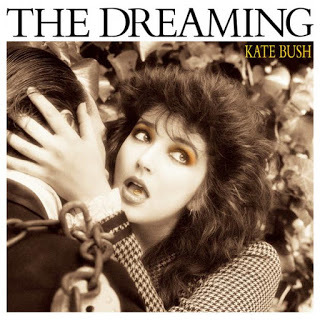 For The Dreaming, Kate Bush throws herself in head first, all batshit and piss, incorporating vocal loops, reverb, and a masterful use of new electronics, in an LP that is campy, romantic and emotive, yet inexplicably avant-garde. She's angry and pensive throughout the LP and typically poetic while pushing around the notions of our male-dominated world. It was here that Bush began to assume more diverse characters in her songs, as well, while utilizing the full range of her voice for dramatic effect. As one would expect from a novice in the producer's chair, there are moments of clutter and fluff, but for every misstep, there's a sense that Bush set out to make The Dreaming something more than she, or any other artist, had made before. The real reward, with this critical success/commercial failure, was how she was able to go so far towards the avant-garde and recover in better shape than before. Even in England, which treated her as a national treasure prior to the album's release, only one single ("Sat In Your Lap") cracked the top twenty. Why her label, after taking such a gamble, agreed to let Kate don the controls again for Hounds of Love is quite astonishing. The Dreaming shows a young woman, manic with ideas and creativity throwing caution to the wind and delivering an off-her-rocker theatrical and abstract masterpiece that very few artists have ever had the courage to make before or since.
For The Dreaming, Kate Bush throws herself in head first, all batshit and piss, incorporating vocal loops, reverb, and a masterful use of new electronics, in an LP that is campy, romantic and emotive, yet inexplicably avant-garde. She's angry and pensive throughout the LP and typically poetic while pushing around the notions of our male-dominated world. It was here that Bush began to assume more diverse characters in her songs, as well, while utilizing the full range of her voice for dramatic effect. As one would expect from a novice in the producer's chair, there are moments of clutter and fluff, but for every misstep, there's a sense that Bush set out to make The Dreaming something more than she, or any other artist, had made before. The real reward, with this critical success/commercial failure, was how she was able to go so far towards the avant-garde and recover in better shape than before. Even in England, which treated her as a national treasure prior to the album's release, only one single ("Sat In Your Lap") cracked the top twenty. Why her label, after taking such a gamble, agreed to let Kate don the controls again for Hounds of Love is quite astonishing. The Dreaming shows a young woman, manic with ideas and creativity throwing caution to the wind and delivering an off-her-rocker theatrical and abstract masterpiece that very few artists have ever had the courage to make before or since. Each track covers subjects from war ("Pull Out The Pin") to the protection of Aboriginal homelands ("The Dreaming"). Although The Dreaming hit No.3 on the UK charts, it was not a commercial success. "The Dreaming" (song) was a poor choice of single in July 1982. A superb track featuring Rolf Harris on didgeridoo and Kate singing in a quasi-Aussie accent ("Bang! goes another kanga on the bonnet of the van"), but simply not a song that would ever get much radio play (it peaked at No. 48). In fact, one of the problems with the album from a commercial point of view is that it contained nothing even resembling a commercial single. EMI, perhaps influenced by the success of "Sat In Your Lap" did not seem to pick up on it, and Kate was never asked to "come up with a hit" (a probable mandate for any other artist at the time). This lack of hits (the third and final single, "There Goes A Tenner," didn't even chart) is one of the reasons why the album is less well known. Conversely, it makes it much easier to listen to the album as a singular piece of work without a "Babookska" or a "Wuthering Heights." (Kate was canny enough to recognize this no-singles problem when it came to Hounds Of Love, on which she wore her commercial hat on side one (relatively speaking) and then tossed the hat in the fire for side two. "Running Up That Hill" creating the audience for The Ninth Wave and "Waking the Witch.") In the end, critics didn't really know what to make of The Dreaming. "Mixed" reviews is probably a good summary. "Overproduced" is the most common criticism. Generally speaking, it's come to be recognized as a significant work that many fans would include in their top Kate albums, jostling for number one spot. True Gaffa fans will argue The Dreaming to their death. For this writer it's among Kate’s best while certainly the least accessible, and frankly, it's just too sexy to talk about. The Dreaming is erotic art for the senses.
Each track covers subjects from war ("Pull Out The Pin") to the protection of Aboriginal homelands ("The Dreaming"). Although The Dreaming hit No.3 on the UK charts, it was not a commercial success. "The Dreaming" (song) was a poor choice of single in July 1982. A superb track featuring Rolf Harris on didgeridoo and Kate singing in a quasi-Aussie accent ("Bang! goes another kanga on the bonnet of the van"), but simply not a song that would ever get much radio play (it peaked at No. 48). In fact, one of the problems with the album from a commercial point of view is that it contained nothing even resembling a commercial single. EMI, perhaps influenced by the success of "Sat In Your Lap" did not seem to pick up on it, and Kate was never asked to "come up with a hit" (a probable mandate for any other artist at the time). This lack of hits (the third and final single, "There Goes A Tenner," didn't even chart) is one of the reasons why the album is less well known. Conversely, it makes it much easier to listen to the album as a singular piece of work without a "Babookska" or a "Wuthering Heights." (Kate was canny enough to recognize this no-singles problem when it came to Hounds Of Love, on which she wore her commercial hat on side one (relatively speaking) and then tossed the hat in the fire for side two. "Running Up That Hill" creating the audience for The Ninth Wave and "Waking the Witch.") In the end, critics didn't really know what to make of The Dreaming. "Mixed" reviews is probably a good summary. "Overproduced" is the most common criticism. Generally speaking, it's come to be recognized as a significant work that many fans would include in their top Kate albums, jostling for number one spot. True Gaffa fans will argue The Dreaming to their death. For this writer it's among Kate’s best while certainly the least accessible, and frankly, it's just too sexy to talk about. The Dreaming is erotic art for the senses.
Published on June 22, 2018 05:29
June 21, 2018
Never For Ever - Kate Bush
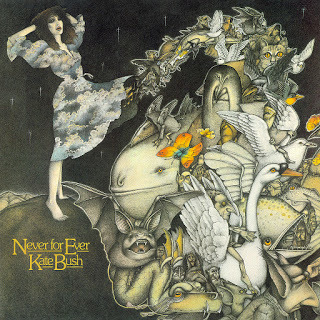 Kate's third studio album saw a complete change of direction - a trait which would repeat itself with each subsequent album release to date. Whereas its predecessors, The Kick Inside and Lionheart, were released in quick succession and inevitably sounded similar, Never for Ever was a sea change of vocal nuances, delivery, and instrumentation.
Kate's third studio album saw a complete change of direction - a trait which would repeat itself with each subsequent album release to date. Whereas its predecessors, The Kick Inside and Lionheart, were released in quick succession and inevitably sounded similar, Never for Ever was a sea change of vocal nuances, delivery, and instrumentation.The latter was due in no small part to Kate's discovery of the Fairlight synthesizer, introduced to her by Richard Burgess of the now long-forgotten Landscape. The Fairlight allowed Kate to experiment with sampling and soundscaping - skills which would be honed to perfection on her next two releases. Never for Ever, like all of Kate's albums, provides its fair share of intense emotional impact. "The Infant Kiss" is among the most haunting piece of music you will ever hear - shivers down the spine. Other tracks worthy of mention include "Army Dreamers" - Kate's first use of Irish instrumentation blends beautifully with the sampled "rifle" percussion. Likewise, the soundscaping in "Egypt" demonstrated a talent for sculpting sound through experimentation. The last song, however, "Breathing" is haunting, innovative, dramatic and sumptuous, among the best Kate's ever done. If the rest of the album is enjoyable and anticipatory, "Breathing" deserves 6 of 5 stars.
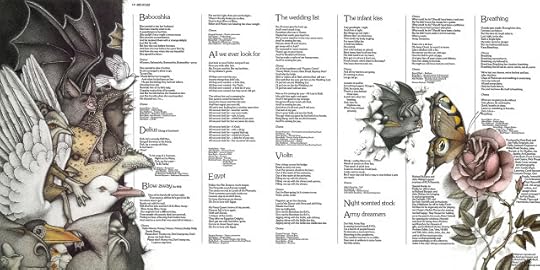
The Cold War-influenced track marked a big leap forward for Kate from her earlier piano-based songs, being significantly influenced by progressive-rock allies Peter Gabriel and Pink Floyd. Kate herself has said that she sat down to write a Pink Floyd song, in which mode she made effective use of a Fairlight CMI synthesizer, a heavy-guitar climax, and some post-apocalyptic imagery: ‘After the blast/ chips of plutonium are twinkling in every lung’. She also added a spoken-word section that wouldn’t sound out of place on The Wall, though here it is seemingly a newsreader describing the impact of a nuclear bomb: ‘After the flash a fireball can be seen to rise, sucking up under it the debris, dust and living things around the area of the explosion’. While such downbeat ‘lyrics’ were almost certainly not reproduced in Smash Hits magazine, they didn’t hinder the song from getting to an impressive number 16 in the UK chart, sandwiched between the Average White Band’s funky ‘Let’s Go Round Again’ and David Essex’s motor-racing-themed ‘Silver Dream Machine’, as unlikely as it may seem.
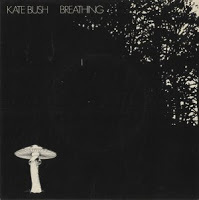 Not only was it ground-breaking and ahead of its time, it was the springboard for the creative forces that went on to produce two of the most finely-crafted and intricate recordings of the modern era, namely 'The Dreaming' and 'Hounds of Love'.Not only was it ground-breaking and ahead of its time, it was the springboard for the creative forces which would go on to produce two of the most finely-crafted and intricate recordings of the modern era, The Dreaming and Hounds of Love.
Not only was it ground-breaking and ahead of its time, it was the springboard for the creative forces that went on to produce two of the most finely-crafted and intricate recordings of the modern era, namely 'The Dreaming' and 'Hounds of Love'.Not only was it ground-breaking and ahead of its time, it was the springboard for the creative forces which would go on to produce two of the most finely-crafted and intricate recordings of the modern era, The Dreaming and Hounds of Love.
Published on June 21, 2018 04:23
June 20, 2018
Kate Bush - Lionheart
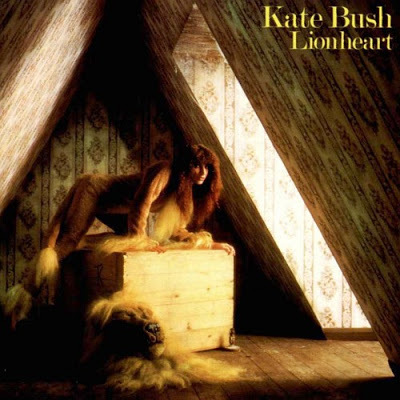 Kate Bush's follow-up single to "Wuthering Heights" was "The Man With the Child in his Eyes." Here we see Kate's lyricism at its best. Who was the man? Was Kate the child in his eyes? The interpretation has often been needled with the speculation that the man was David Gilmour, though a timeline would suggest the song was written before Gilmour was Kate's artistic paramour. Conversely, the man with the child in his eyes is Kate's toying early on with Peter Pan. Is the man childlike or childish; is he young at heart or immature? That ambiguity is what great writing is all about. Kate would run with this in her quick follow-up to The Kick Inside, Lionheart.
Kate Bush's follow-up single to "Wuthering Heights" was "The Man With the Child in his Eyes." Here we see Kate's lyricism at its best. Who was the man? Was Kate the child in his eyes? The interpretation has often been needled with the speculation that the man was David Gilmour, though a timeline would suggest the song was written before Gilmour was Kate's artistic paramour. Conversely, the man with the child in his eyes is Kate's toying early on with Peter Pan. Is the man childlike or childish; is he young at heart or immature? That ambiguity is what great writing is all about. Kate would run with this in her quick follow-up to The Kick Inside, Lionheart.The Kick Inside was unleashed onto the world without precedent, and strictly speaking Lionheart could be written off as The Kick Inside, Volume 2, though it stands alone as a separate work more lush and less circumspect than its predecessor. "Symphony in Blue" opens the set and sets its tone throughout: the many idiosyncrasies that make up Love ("The more I think about sex, the better it gets/ Here we have a purpose in life." Who am I to argue with that?). The production is more intricate and thoughtful, with Kate’s impetus more clearly integrated into the sessions, which obviously suits Kate’s vocals as well as her lyrical subjects. The pulsating "In Search of Peter Pan" was and remains one of my faves with innocent Kate at her dramatic best once again underscored by great production, particularly with the lilting "Second star on the right, straight on till morning" which segues so skillfully into the hit single "Wow." Who but Kate could sing wow over and again to such brilliance. Unbelievable. The sultriness of Kate combined with her theatrics raised music to a new level in 1979. The album's singles did not fare as well as may have been hoped. "Hammer Horror," a dramatic ode to the film studios, stalled outside the U.K. Top 40, and the follow-up, "Wow," was far more successful yet failed to dent the U.K. Top 10, yet Lionheart wasn’t about chart positions or commercial success. Keep in mind that this was all but missed in America, with the exception of a small cult following. My own undertakings to find Lionheart (unreleased in the U.S.) was a trek that finally ended in an obscure record store in Santa Monica, spurred on by mention of the LP in Smash Hits.
One of the album’s two highlights, "Don’t Push Your Foot on the Heartbrake" accelerates and climaxes in a manner afforded only Kate, and all the better for its raucousness. Side one ends with "Oh England, My Lionheart." Not your ordinary patriotic ditty, but a love song to the country that raised her, cleverly weaving into the lyrics what Kate identifies as England, much in the same way that Paul McCartney did with "Penny Lane." The beautiful ballads "Fullhouse" and "In the Warm Room" expand on Kate's poet laureate prowess. "Imagination sets in./ Then all the voices begin./ Telling you things that aren't happening./ (But they nig and they nag, 'til they're under your skin.)" Now that’s schizophrenia!
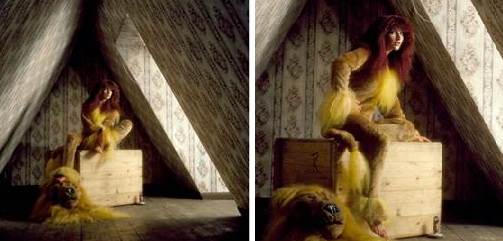
"Kashka from Baghdad" is another truly insightful track and another highlight of the LP, the lush production providing the contemporary atmospherics and story-telling: neighbors gossiping about other male neighbors who live together, and thus the are they or are they not debate begins. Sensitive Kate Jackanories* her way through a somewhat taboo subject: “At Night They’re seen,/ Laughing, loving,/ They know the way,/ To be happy,” but of course they're not allowed.
More eccentric short-storytelling comes in the quirky "Coffee Homeground" which sees Kate in a playful mood espousing the value of poisons. The backing is synthesized accordion which brings the track to life and affords it a somewhat European styling. The sultry, dramatic and oh so grand "Hammer Horror" brings up the rear and closes the set, overwhelming us as Kate weaves between pathos and upbeat, confusing the listener as to what should be felt, which emotion is right here. "Hammer Horror" would be right at home in a dramatic West End or Broadway musical.
Lionheart was the second album in Kate’s LP triumvirate that made up the first phase of her career. Many foolishly dismiss this outing as a rush release. There is a definite and thoughtful progression here setting it apart from The Kick Inside, yet it is sadly so often critically over-shadowed by its more famous predecessor.
*Jackanory was a long-running BBC children's television series that was designed to stimulate an interest in reading.
Published on June 20, 2018 04:57



